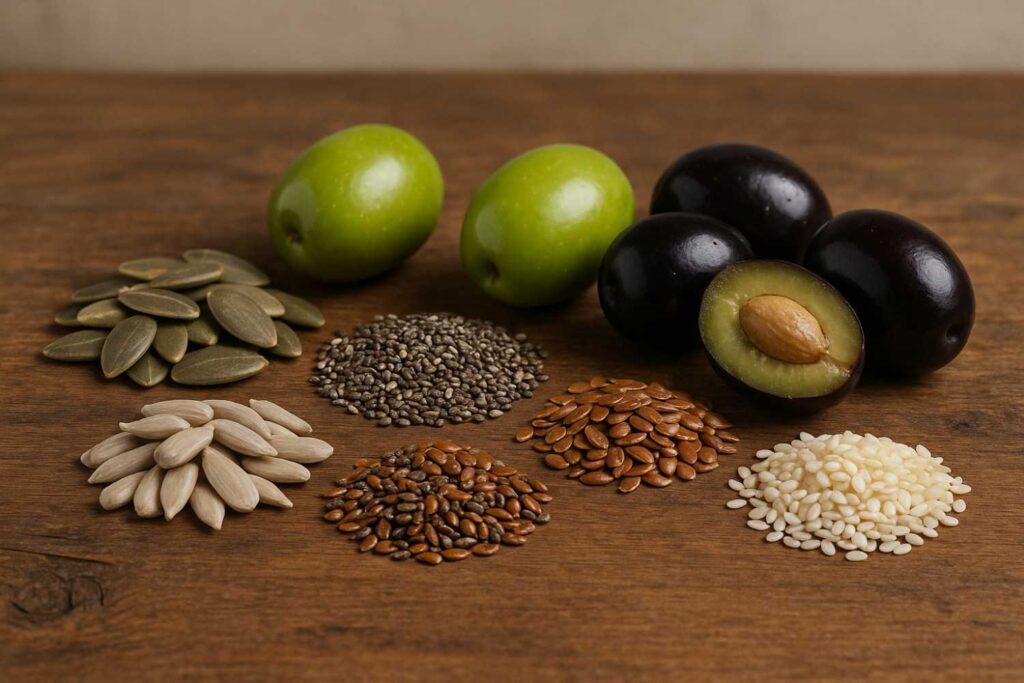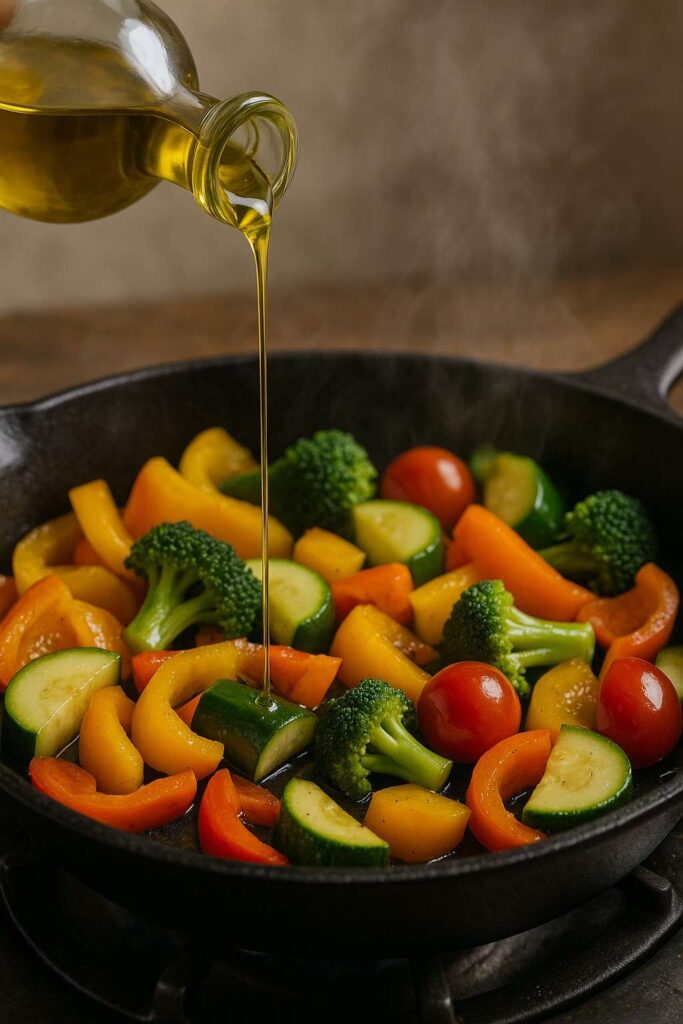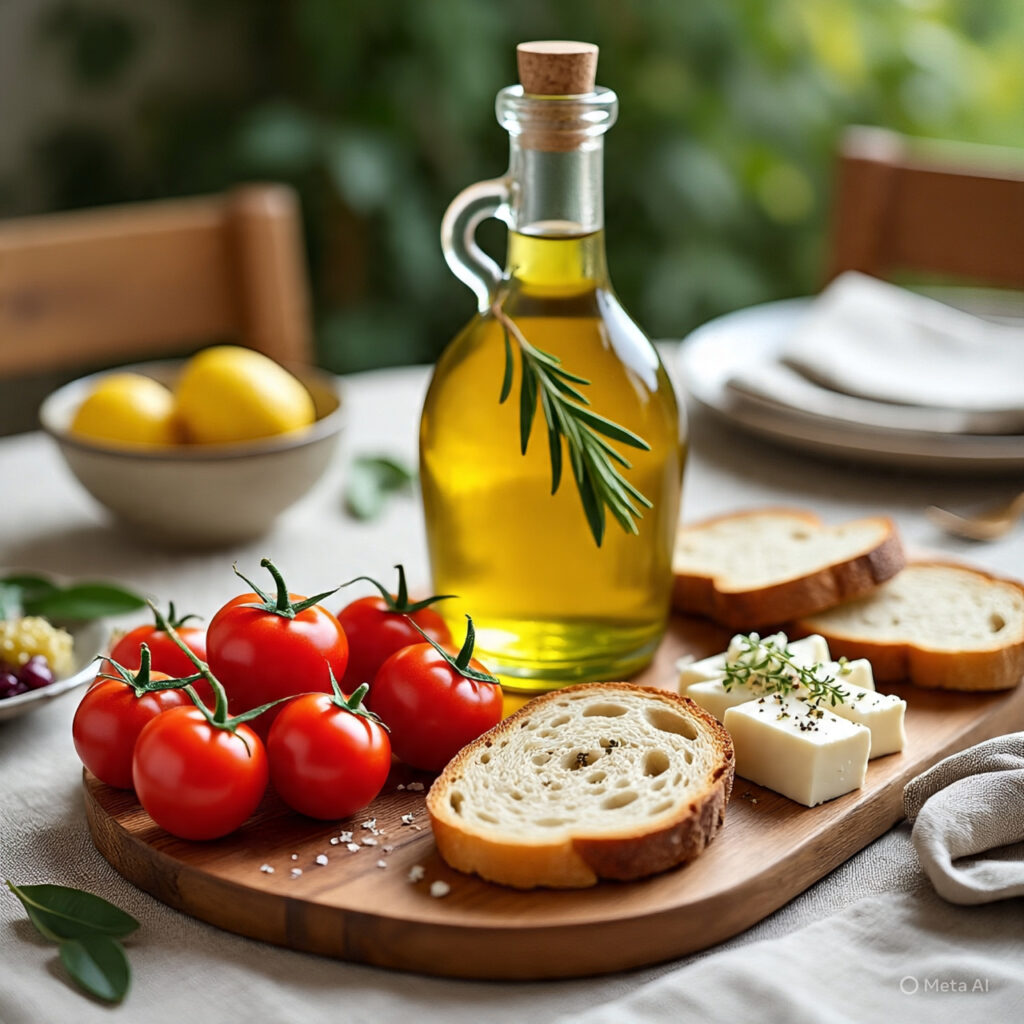You’re standing in the grocery store aisle, overwhelmed by the wall of cooking oils. Canola, sunflower, safflower, and there it is—your trusty bottle of olive oil. But wait, a thought crosses your mind: is olive oil a seed oil?
I’ve been there too, squinting at labels and wondering if my go-to cooking companion belongs in the same category as those heavily processed seed oils everyone’s been talking about lately. The answer might surprise you, and it’s about to change how you think about your kitchen staples.
The Short Answer That’ll Blow Your Mind
No, olive oil is not a seed oil.
Olive oil comes from the fruit of the olive tree—specifically, the flesh of olives. It’s a fruit oil, not a seed oil. Think of it this way: when you bite into an olive, you’re tasting the part that becomes olive oil, while the hard pit in the center is the seed (which, fun fact, nobody uses for oil production anyway).
This distinction isn’t just botanical trivia—it’s the key to understanding why olive oil behaves so differently from seed oils in your body and your kitchen.
What Makes Seed Oils Different (And Why It Matters)
Seed oils come from—you guessed it—seeds. We’re talking about oils extracted from sunflower seeds, sesame seeds, flax seeds, and others. These oils require different extraction methods and have completely different nutritional profiles.

Here’s where it gets interesting: most commercial seed oils undergo heavy processing involving heat, chemicals, and refinement. Olive oil, especially extra virgin olive oil, can be extracted through simple mechanical pressing—no chemistry degree required.
| Olive Oil (Fruit Oil) | Typical Seed Oils |
| Extracted from olive fruit flesh | Extracted from plant seeds |
| Cold-pressed (extra virgin) | Often heat-processed |
| Minimal processing possible | Usually heavily refined |
| High in monounsaturated fats | Often high in polyunsaturated fats |
| Stable at cooking temperatures | Can oxidize easily when heated |
The Best of Olive Oil: Why It’s Different
When we talk about the best of olive oil, we’re really discussing why it stands apart from the crowd. I remember the first time I tasted real, high-quality extra virgin olive oil—it was like discovering that water could have flavor. The peppery finish, the grassy notes, the way it made even simple bread taste extraordinary.
Olive oil best practices have been refined over thousands of years. The Mediterranean has been perfecting this art since ancient civilizations, and there’s a reason it’s remained virtually unchanged: it works.
What Makes Quality Olive Oil Special:
- Single extraction method: The best oils come from the first pressing
- No chemical additives: Pure mechanical extraction
- Immediate processing: Olives are pressed within hours of harvest
- Protected from light and air: Proper storage maintains quality
Is Cold Pressed Olive Oil Better?
Absolutely, and here’s why this matters more than you might think. Cold pressed olive oil means the olives were processed without heat, preserving delicate compounds that give olive oil its health benefits and distinctive flavor.
When oils are heated during extraction, they lose valuable nutrients and can develop off-flavors. It’s like the difference between fresh-squeezed orange juice and the stuff that’s been sitting on a truck for weeks—technically the same product, but worlds apart in quality.
I always tell people: if you’re going to invest in one premium cooking ingredient, make it a good bottle of cold-pressed extra virgin olive oil. You’ll taste the difference in everything from salad dressings to finishing touches on pasta.
Olive Oil for Cooking: Debunking the Heat Myths
Let’s address the elephant in the room: olive oil for cooking has gotten a bad rap. You’ve probably heard that you shouldn’t cook with olive oil because it has a “low smoke point.” This is one of those half-truths that spread faster than gossip at a high school reunion.
Can I Deep Fry with Olive Oil?
Can I deep fry with olive oil? You can, but it’s like using champagne to make sangria—technically possible but probably not the best use of your money. Extra virgin olive oil has a smoke point around 375°F, which is actually higher than many people think. However, for deep frying, you’re better off using regular olive oil (not extra virgin) or another oil with a higher smoke point.
For most cooking, though? Olive oil is fantastic. I use it for:
- Sautéing vegetables (medium heat)
- Pan-searing proteins
- Roasting in the oven
- Making dressings and marinades

The Benefits of Olive Oil: More Than Just Flavor
The benefits of olive oil extend far beyond making your food taste amazing. This liquid gold is packed with antioxidants, healthy fats, and compounds that have been linked to everything from heart health to cognitive function.
Key Health Benefits:
Monounsaturated Fats: These are the “good fats” that can help improve cholesterol levels and reduce inflammation.
Antioxidants: Compounds like vitamin E and polyphenols that fight oxidative stress in your body.
Anti-inflammatory Properties: Regular consumption may help reduce chronic inflammation, which is linked to numerous health issues.
I’ve noticed that when I consistently use olive oil instead of processed seed oils, I feel more satisfied after meals and have more stable energy levels throughout the day. Could be coincidence, but the research suggests there’s real science behind this observation.
Frequently Asked Questions: Your Olive Oil Mysteries Solved
Is Olive Oil Gluten Free?
Is olive oil gluten free? Yes, pure olive oil is naturally gluten-free. Olives don’t contain gluten, and the extraction process doesn’t introduce any gluten-containing ingredients. However, always check labels on flavored olive oils, as additives might contain gluten.
Does Olive Oil Freeze?
Does olive oil freeze? Not exactly. Olive oil will solidify and become cloudy when very cold (around 35-40°F), but it doesn’t freeze solid like water. If your olive oil gets thick in the fridge, just let it come to room temperature—it’ll return to its liquid state without any quality loss.
Is Olive Oil Comedogenic?
Is olive oil comedogenic? This is where it gets personal. Olive oil rates about 2 out of 5 on the comedogenic scale, meaning it has a moderate likelihood of clogging pores. Some people use it as a natural moisturizer without issues, while others find it too heavy. If you have acne-prone skin, patch test first.
Can Olive Oil Store Flavor from Food?
Can olive oil store flavor from food? Absolutely, and this is both a blessing and a curse. High-quality olive oil can absorb and retain flavors from garlic, herbs, or other ingredients you cook with it. Store used olive oil separately from fresh oil to prevent flavor transfer.
Is Olive Oil a Preservative in Shampoo?
Is olive oil a preservative in shampoo? While olive oil has some natural antimicrobial properties, it’s not typically used as a primary preservative in shampoos. It’s more commonly added for its moisturizing and conditioning benefits. Real preservatives in shampoos are usually synthetic compounds designed specifically for that purpose.
Can Canola Oil Substitute Olive Oil?
Can canola oil substitute olive oil? Technically yes, but you’ll lose flavor and some health benefits. Canola oil is neutral-tasting and has a higher smoke point, making it suitable for high-heat cooking. However, it lacks olive oil’s distinctive flavor and antioxidant content. Use canola when you need a neutral oil, stick with olive oil when flavor matters.
Can You Reuse Olive Oil?
Can you reuse olive oil? Yes, but with caveats. You can strain and reuse olive oil that’s been used for light cooking, but each use degrades its quality. Don’t reuse oil that’s been heated to very high temperatures, has been used to cook strong-flavored foods, or looks dark or smells off.
Insert image of olive oil being strained through a fine mesh strainer
The Truth About Processing: Why Source Matters
Here’s something most people don’t realize: not all olive oils are created equal, and the processing method makes all the difference. When I first learned about how mass-market olive oils are made, it completely changed my shopping habits.
Extra Virgin Olive Oil: First cold pressing, no chemicals, minimal processing Virgin Olive Oil: Second pressing, still no chemicals, slightly more acidic Pure/Light Olive Oil: Refined and processed, often mixed with small amounts of virgin oil
The processing differences explain why a $3 bottle of “olive oil” tastes nothing like a $25 bottle of estate-grown extra virgin. It’s not just marketing—you’re literally buying different products.
Making the Switch: Practical Tips for Olive Oil Newbies
If you’re ready to upgrade your oil game, here’s how to do it without breaking the bank or overwhelming your palate:
Start with one good bottle of extra virgin olive oil for finishing dishes and dressings. Use it to drizzle over salads, finished pasta, or crusty bread.
Keep a cheaper option for general cooking. You don’t need the expensive stuff for every application.
Store properly: Keep olive oil in a cool, dark place. That pretty bottle on your counter looks great but will degrade the oil faster.
Trust your senses: Good olive oil should smell fresh and fruity, not rancid or musty. If it smells off, it probably is.
The Bottom Line: Why This Distinction Matters
So, is olive oil a seed oil? Definitively no. This isn’t just semantic nitpicking—it’s about understanding what you’re putting in your body and how it affects your health.
Olive oil’s status as a fruit oil means it has different nutritional properties, processing requirements, and health impacts compared to seed oils. When you choose olive oil, you’re choosing a minimally processed, nutrient-dense fat that’s been nourishing Mediterranean populations for millennia.
The next time someone asks you whether olive oil is a seed oil, you can confidently set the record straight. Better yet, invite them over for dinner and show them what real olive oil can do for a simple meal. Because at the end of the day, the best argument for olive oil isn’t scientific—it’s delicious.

Your Next Steps: Embracing the Olive Oil Lifestyle
Ready to make olive oil your kitchen MVP? Start small, invest in quality, and pay attention to how different oils affect both your cooking and how you feel. Your taste buds—and your body—will thank you.
What’s your favorite way to use olive oil? Have you noticed a difference since switching from seed oils? Share your experiences in the comments below—I’d love to hear about your olive oil journey.Before you go, if you’re curious about other cooking oils or want a full breakdown of what makes an oil healthy, check out our complete guide to edible oils.

Pingback: Best Oils for Heart Health: Your Ultimate Guide to Choosing Wisely -